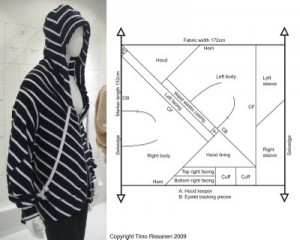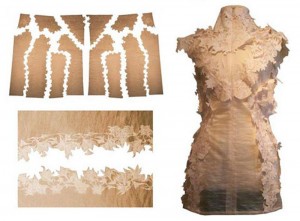
Image: zerofabricwastefashion.blogspot.com
Social responsibility has become an important aspect of being a citizen of the world. But are we being socially responsible, or just pretending to be? Do we know how much energy, water, transportation, and exploitation of the worker is put into producing an artifact? Are we aware of the amount of “stuff” we collect in our lives?
On September 11, Timo Rissanen gave a lecture at the Global Issues class. He talked about his interest in sustainable fashion, and the ways in which fashion is part of our daily life—be it consciously or unconsciously. His interest in “where things come from” should be our interest too. Designers are trained to be creative, to innovate, but there is gap between what they envision and how it gets produced; there is a lack of understanding of the many processes involved in producing a line. It is frustrating to see talented fashion designers struggle in this economy because they only design high end pieces, which production cost runs in the thousands; they might be able to grab the attention of celebrities, and make it into magazines and music videos, but are unable to sell their collections.

image: outsapop.com
Timo’s idea of “Zero Waste Design” is to re-invent clothing patterns in order to minimize fabric waste while scraps are used to produce underwear and accessories. His installation, “No Waste/Zero Waste” makes waste visible by creating simple t-shirts that are sold at production cost, and giving away the fabric leftovers as a way to help people imagine how much waste goes into the landfills. He is teaching a new class at Parsons where students will have the opportunity to challenge themselves in a new market and find value on scarcity, using scraps to create aesthetically beautiful garments. They will concentrate on re-designing jeans to make them more sustainable in their “post-retail life”. What is being produced now, at a small scale, is pretty amazing. Timo recommends looking at these designers’ work:
Although the idea of 0% waste seems promising, corporations might be reluctant to take the leap and change their production systems due to the cost involved. What if, while corporations decide whether to embark on this venture or not, this becomes a trend: garments that function as a social-responsibility stamp of approval? Could Zero Waste Design become a self-sustained system of consumption; a new fashion statement that perpetuates hyper-consumption and we end up collecting more “stuff”?
Further Reading:
